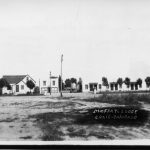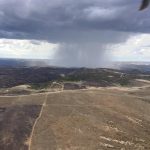Moffat County Extension: After the disaster — A toolkit for Landowners impacted by wildfire
Moffat County Extension Director

Given our experience with numerous fires in northwest Colorado this summer, let’s discuss what to do after a disaster.
Colorado State University Extension, CSU Warner College of Natural Resources, CSU Veterinary Medicine and Biomedical Sciences, Colorado State Forest Service, and other Extension professionals have created a guidebook specifically for Moffat County to assist residents impacted by wildfire. This guidebook offers step-by-step guidance on the immediate actions to take following a disaster. It includes important local phone numbers and websites and offers helpful checklists.
During a wildfire or disaster, inform others that you’re safe. This will help local first responder know where to focus their recovery efforts. Wait for official clearance before returning home. Wildfires are unpredictable and constantly changing; even if it seems the danger has passed, hot spots can flare up or embers may shift back depending on wind conditions.
Stay updated through trustworthy sources like the Moffat County Sheriff’s Office by calling their dispatch line at 970-824-4495. Sign up for emergency alerts at member.everbridge.net/819965091381281/login, or follow their website and social media pages. Be cautious on social media by following first responder pages like Moffat County Sheriff, Craig Police Department or Craig Fire/Rescue to avoid misinformation.
When sharing or reposting, use posts directly from those first responder pages. Useful fire information websites and apps include watchduty.org or inciweb.wildfire.gov. Fire communication specialists manage these webpages, ensuring they provide the most accurate, real-time information.
The next step is to start a recovery notebook. This will help you keep track of important conversations and information as you communicate with insurance companies, banks, utility companies, mortgage lenders, doctors and health insurance providers. Ask utility companies if they can temporarily suspend services until you return home.
Contact your doctor or pharmacy if new prescriptions need to be made or delivered to another location. Contact UPS, FedEx or the Post Office to inform them of your situation; they may be able to hold or transfer mail for you for a short period. Be sure to include the name of the person you spoke with, the incident number if available, dates, items lost, and other relevant details. The more information, the better.
When it is safe to return to your property, exercise extreme caution. Many hazards may still be present and not visible to the naked eye. This can include structural damage to the home or outbuildings, unstable roads and terrain, weakened trees, damaged electrical poles, and damaged septic systems or wells.
Assume well water is unsafe to drink until proper testing has been conducted. After receiving the all-clear to return home, promptly assess the damage. Wear appropriate clothing, an N95 or P-100 mask, gloves, bring cleaning supplies, first aid supplies, as well as snacks and water. Thoroughly document damage and take plenty of photos. Create a list of restoration tasks that need to be completed. Before starting any restoration work, talk with your insurance representative to ensure you have thoroughly documented everything and they have all the information needed to begin a claim.
Farmers and ranchers should contact the local Moffat County Farm Service Agency at 970-824-3476 to inquire about available assistance programs. During recovery efforts, keep a record of progress, quotes or estimates and all receipts. Start replacing any essential documents that may have been lost or damaged, such as driver’s licenses, marriage and/or birth certificates, passports, credit or debit cards, and tax papers. Evaluate corrals, barns, sheds, pastures and feed before returning pets or livestock. Fire’s are also stressful for animals. Ensure they have clean water and food. Remember, terrain affected by fire will be more prone to flooding. Ash from trees and plants is usually non-toxic, but ash from burned buildings can be toxic.
Every disaster is unique and impacts everyone differently. Remember, you’re not alone, and resources are available to support you during this tough time. Be kind to yourself. Don’t hesitate to reach out to loved ones or professionals to talk about what you’re experiencing. Make time for healthy or enjoyable activities. Do your best to rest and unwind. Be mindful of your screen time. Contact your local extension office for an after-disaster guidebook, additional emergency resources pre and post fire, and resources for coping with disaster.

Support Local Journalism

Support Local Journalism
Readers around Craig and Moffat County make the Craig Press’ work possible. Your financial contribution supports our efforts to deliver quality, locally relevant journalism.
Now more than ever, your support is critical to help us keep our community informed about the evolving coronavirus pandemic and the impact it is having locally. Every contribution, however large or small, will make a difference.
Each donation will be used exclusively for the development and creation of increased news coverage.




